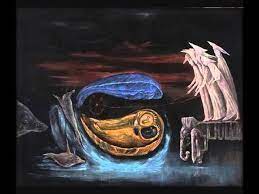명곡감상
이탈리아의 작곡가 루이지 달라피콜라 (Luigi Dallapiccola, 1904 ~ 1975)의 Commiato (1972)
루이지 달라피콜라 (이: Luigi Dallapiccola, 1904년 2월 3일 ~ 1975년 2월 19일)는 이탈리아의 작곡가이다.

– 루이지 달라피콜라 (Luigi Dallapiccola)
.출생: 1904년 2월 3일, 크로아티아 파진
.사망: 1975년 2월 19일, 이탈리아 플로렌스
.장르: 클래식
.오페라 대본: Il prigioniero, Ulisse, Volo di notte
.학력: Luigi Cherubini Conservatory of Music
.음반사: Hyperion Records, 챈도스 레코드, NAIVE, 에라토 레코드, Stradivarius, Capriccio 등
루이지 달라피콜라 (1904 ~ 1975)는 이탈리아의 작곡가로 이탈리아에서 처음으로 십이음 기법을 구사하면서도 따뜻하고 정감 넘치는 작품을 남겼다.
작품에 오페라 <야간 비행>, 합창곡 <포로의 노래> 등이 있다.

○ 생애 및 활동
루이지 달라피콜라 (Luigi Dallapiccola)는 1904년 2월 3일, 크로아티아 파진에서 출생했다.
피렌체의 음악원에서 작곡과 피아노를 배웠으며 졸업 후에는 피아니스트와 작곡가로 활동하였다.
1924년 20세 때 쇤베르크가 지휘한 <달의 피에로>를 듣고 충격을 받아 드디어 12음기법에 의한 작품을 쓰게 되었다.
1939년 35세 때 완성한 오페라 <야간비행>은 12음기법으로 된 그의 대표작 가운데 하나이다.
제2차 세계 대전 중에 전곡이 완성된 합창곡 <포로의 노래>는 권력에 대한 혐오와 반항을 노래한 이색적인 합창곡이나 전시라는 특수한 환경 속에서 권력에 대한 혐오는 점차로 고조되어 드디어 그 기분이 오페라 <포로>의 붓을 들게 하였다.
이 오페라는 종전 후의 1948년에 완성을 보았다.
전쟁 후 달라피콜라의 명성은 세계적인 것이 되었고 12음음악의 위대한 권위자로 높이 평가되고 있다.
루이지 달라피콜라 (Luigi Dallapiccola)는 1975년 2월 19일, 이탈리아 플로렌스에서 별세했다.

- 야간 비행
1930년경 야간비행을 처음 시작한 부에노스아이레스의 항공회사 사무실을 무대로 위험이 따른 야간비행에 대결하는 사람들의 심리적 갈등을 묘사한 심리 오페라이다.
.가사
한땐 내가 날 이해못할 때가 있었지
니 곁을 떠나는 마음이 가벼운 나를
그것이 널 위한 거란 생각들이
날 떠나게 했었지만
지금은 이해하려 애쓰고 싶지 않아
이제와 어둠을 나는 내 설레는 기분
사실은 생각할 수 조차 없었어
왜 돌아가려 하는지
*난 이제야 네게 솔직할 수 있어
먼곳에 있어도 지워질 수 없는 건
사랑이야 그건 사랑이야
너에게로 다가섰을 때 네게
어둠 속을 설레이는 나의 마음들을
가르쳐 주고 싶어
조금쯤 알곤 있었지만 할 수 없음을
시간이 흘러도 널 잊을 수는 없다고
널 잊을 수 없는 나의 마음들이
외로움이 아닌 것도
*Repeat
조금만 기다려 줘 할 수 있다면
뒤늦은 지금이 시작일 수 있도록
넌 알고 있니
사랑이란 깊을수록 말하기 어려운 걸
그때 내가 필요하다는 걸
말로 할 수 없었던 것처럼
정말 필요할 땐 필요하단 말보단
필요하지 않다는 말이 먼저 나오는 거야
그래 이건

○ List of works
Partita (1930–32), orchestra
Estate (1932), male chorus
Divertimento in quattro esercizi (1934), soprano, flute, oboe, clarinet, viola, cello
Musica per tre pianoforti (Inni) (1935), three pianos
Sei cori di Michelangelo Buonarroti il Giovane (1932–36), 1st series: unaccompanied mixed voices; 2nd series: two sopranos and two altos and 17 instruments; 3rd series: mixed voices and orchestra
Tre laudi (1936–37), voice and 13 instruments
Volo di Notte (1938), one-act opera
Canti di prigionia (1938–41), for chorus, two pianos, 2 harps and percussion (a: Preghiera di Maria Stuarda; b: Invocazione di Boezio; c: Congedo di Girolamo Savonarola)
Piccolo concerto per Muriel Couvreux (1939–41), piano and chamber orchestra
Studio sul Capriccio n. 14 di Niccolò Paganini (1942), piano
Marsia (1942–43), ballet
Frammenti sinfonici dal balletto Marsia (1942–43), orchestra
Liriche greche (1942–45), a: Cinque frammenti di Saffo, for voice and chamber orchestra; b: Due liriche di Anacreonte, for singer, piccolo clarinet, A clarinet, viola, piano; c: Sex Carmina Alcaei, for canenda voice, nonnullis comitantibus musicis
Il prigioniero (1944–48), opera.
Ciaccona, Intermezzo e Adagio (1945), for solo cello
Sonatina canonica, in mi bemolle maggiore, su Capricci di Niccolò Paganini, per pianoforte (1946), for piano

Rencesvals (1946), baritone and piano
Due studi (1946–47), violin and piano
Due pezzi (1947), orchestra (version of Due studi)
Quattro liriche di Antonio Machado (1948), soprano and piano
Tre episodi dal balletto Marsia (1949), piano
Tre poemi (1949), voice and chamber orchestra
Job (1950), sacra rappresentazione (mystery play)
Tartiniana (1951), violin and orchestra
Quaderno musicale di Annalibera (1952), solo piano, featuring the BACH motif
Goethe-Lieder (1953), for mezzo-soprano, piccolo clarinet, clarinet, and bass clarinet
Variazioni (1954), orchestra (version of Quaderno musicale di Annalibera)
Piccola musica notturna (1954), orchestra
Canti di liberazione (1951–55), for mixed chorus and orchestra
An Mathilde (1955), cantata for soprano and orchestra
Tartiniana seconda (1955–56), violin and piano, or violin and chamber orchestra
Cinque canti (1956), baritone and 8 instruments
Concerto per la notte di Natale dell’anno 1956 (1957), chamber orchestra and soprano
Requiescant (1957–58), chorus and orchestra
Dialoghi (1960), cello and orchestra
Piccola musica notturna (1960–61), chamber ensemble
Three Questions With Two Answers (1962), orchestra
Preghiere (1962), baritone and chamber orchestra
Parole di San Paolo (1964), voice and instruments
Quattro liriche di Antonio Machado (1964), version for soprano and chamber orchestra
Ulisse (1960–68), opera in a prologue and two acts
Sicut umbra… (1970), mezzo-soprano and 12 instruments
Tempus destruendi / Tempus aedificandi (1971), chorus
Ulisse. Suite dall’opera/A (1971), soprano, bass-baritone, orchestra
Ulisse. Suite dall’opera/B (1971), 3 sopranos, mezzo-soprano/alto, tenor, bass-baritone, chorus and orchestra
Commiato (1972), soprano and ensemble

- Writings by Dallapiccola
Appunti. Incontri. Meditazioni., Edizioni Suvini Zerboni, 1970
Dallapiccola on Opera, Selected writings of Luigi Dallapiccola, Vol 1, Toccata Press (1987)
- Writings in English on Dallapiccola
Raymond Fearn, The music of Luigi Dallapiccola. New York, Rochester, 2003
Edward Wilkinson, “An interpretation of serialism in the work of Luigi Dallapiccola”. Phd diss., Royal Holloway, 1982
Ben Earle, “Musical modernism in fascist Italy: Dallapiccola in the thirties”, Phd diss., Cambridge, 2001
Lanza, Andrea (2008). “An Outline of Italian Instrumental Music in the 20th Century”. Sonus. A Journal of Investigations into Global Musical Possibilities. 29/1: 1–21.

○ Luigi Dallapiccola: Commiato (1972)
Luigi Dallapiccola (1904-1975): Commiato, per soprano e orchestra da camera, su testi di Brunetto Latini, 13° secolo (1972)
I. Impetuoso, ma non precipitato
II. Lento assai [01:31]
III. Lento; flessibile [04:55]
IV. Molto sostenuto [08:54]
V. Impetuoso, ma non precipitato [11:49]
Dorothy Dorow, soprano
Royal Concertgebouw Orchestra diretta da Lucas Vis.
Registrazione Live: 7 Gennaio 1979.
Cover image: painting by Leonora Carrington.
참고 = 위키백과, 유투브
크리스천라이프 편집부
